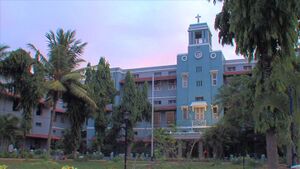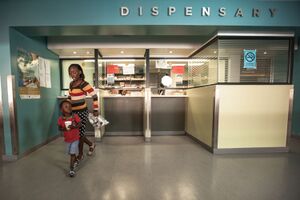Healthcare in the Blackhelm Confederacy: Difference between revisions
| (7 intermediate revisions by the same user not shown) | |||
| Line 1: | Line 1: | ||
[[File:BCPriestDoc.jpg|thumb|right|Priests play a vital role in the Confederate healthcare system, and clergymen provide the bulk of the employees within the nation's healthcare field]] | [[File:BCPriestDoc.jpg|thumb|right|Priests play a vital role in the Confederate healthcare system, and clergymen provide the bulk of the employees within the nation's healthcare field]] | ||
Healthcare in the [[Blackhelm Confederacy]] is divided into three categories: church-related services, private care, and veterans assistance. | '''Healthcare in the [[Blackhelm Confederacy]]''' is divided into three categories: church-related services, private care, and veterans assistance. | ||
The majority of the country relies upon the services of their local parish church for medical care, while veterans and their families can opt to use government-sponsored facilities for primary care and routine disease treatment. Those who can afford it often prefer using private medical providers, and increasingly low-cost private providers are entering the market to cater to those of lower economic levels. | The majority of the country relies upon the services of their local parish church for medical care, while veterans and their families can opt to use government-sponsored facilities for primary care and routine disease treatment. Those who can afford it often prefer using private medical providers, and increasingly low-cost private providers are entering the market to cater to those of lower economic levels. | ||
==Churches== | ==Churches== | ||
[[File:BCChurchHospital.jpg|thumb|left|Sancte Livonius Hospital, a major church-run hospital outside of [[Sacrament]]]] | [[File:BCChurchHospital.jpg|thumb|left|Sancte Livonius Hospital, a major church-run hospital outside of [[Sacrament (city)|Sacrament]]]] | ||
Most churches in the Blackhelm Confederacy also play home to a small family clinic for the treatment of routine illness and disease. The typical church in the country will have one priest who has been fully trained as a general practitioner, as well as a nun certified as a nurse practitioner to cater to the needs of their parish. | Most churches in the Blackhelm Confederacy also play home to a small family clinic for the treatment of routine illness and disease. The typical church in the country will have one priest who has been fully trained as a general practitioner, as well as a nun certified as a nurse practitioner to cater to the needs of their parish. | ||
| Line 31: | Line 31: | ||
==Astyrian Red Cross== | ==Astyrian Red Cross== | ||
The Astyrian Federation of the Red Cross has opened up operations across the Blackhelm Confederacy in order to assist individuals who have inadequate access to medical facilities. The Red Cross facilities are primarily located in rural areas of the country, although hospital ships are also stationed in cities to deal with the disenfranchised urban populations of the country. Including the crew of the hospital ships, there are an estimated | The [[Astyrian Federation of the Red Cross]] has opened up operations across the Blackhelm Confederacy in order to assist individuals who have inadequate access to medical facilities. The Red Cross facilities are primarily located in rural areas of the country, although hospital ships are also stationed in cities to deal with the disenfranchised urban populations of the country. Including the crew of the hospital ships, there are an estimated 1500 members from AFRC agencies throughout the region operating within the Blackhelm Confederacy at any given time of the year. | ||
==See also== | |||
* [[AFRC Humanitarian Mission to the Blackhelm Confederacy]] | |||
* [[Emergency medical services in the Blackhelm Confederacy]] | |||
{{Blackhelm Confederate Topics}} | {{Blackhelm Confederate Topics}} | ||
[[Category:Blackhelm Confederacy]][[Category:Astyria]] | [[Category:Blackhelm Confederacy]][[Category:Astyria]] | ||
Latest revision as of 21:37, 30 January 2024
Healthcare in the Blackhelm Confederacy is divided into three categories: church-related services, private care, and veterans assistance.
The majority of the country relies upon the services of their local parish church for medical care, while veterans and their families can opt to use government-sponsored facilities for primary care and routine disease treatment. Those who can afford it often prefer using private medical providers, and increasingly low-cost private providers are entering the market to cater to those of lower economic levels.
Churches

Most churches in the Blackhelm Confederacy also play home to a small family clinic for the treatment of routine illness and disease. The typical church in the country will have one priest who has been fully trained as a general practitioner, as well as a nun certified as a nurse practitioner to cater to the needs of their parish.
In addition to the smaller clinics, there are also a number of large hospitals throughout the nation run by the church, staffed primarily by clergy and volunteers. Some lay physicians also work their, their salary provided through church coffers.
Veterans
The Blackhelm Confederate government does offer limited health assistance to veterans and family members of veterans. The primary purpose behind the government program is to track and control the spread of dangerous diseases, but clinics and hospitals can also be called upon to provide routine medical services to the qualifying population as well.
Polyclinics
Polyclinics are medical facilities primarily for outpatient care located in many neighborhoods. Former and current veterans, as well as their family members can receive treatment at a polyclininc for free, by a physician that is assigned to them. These facilities serve to treat simple problems, provide vaccinations, and do diagnostics. Some equipment like magnetic resonance and computed tomographic imaging devices, however, are almost nonexistant.
Many people report that they have little confidence in polyclinic physicians, and that they usually visited them to get a work excuse. Medicines are usually imported from outside the Confederacy, principally from Nikolia, but people are able to purchase alternatives at low prices from pharmacies, if they are able to find them.
Hospitals
Veteran's hospitals are organized in some sort of gradation by size and complexity with established population catchment areas so that the veteran and veteran family population base is known and exclusive. Hospitals are staffed on a salary basis by a range and quantity of specialists, according to professionally agreed-on norms. The primary function of these locations are to control contagious diseases, as well as perform tasks that might be out of the realm of the polyclinics, such as x-rays, CT scans, and other things of that nature, as well as some minor surgeries. Additionally, they serve as places for people to recover from illnesses such as influenza or gastroenteritis. For anything requiring more complex treatment, such as by-pass surgeries or chemotherapy, however, people will typically need to rely on either the church or on private enterprise.
Dispensaries
The Blackhelm Confederacy is also host to a number of specialized dispensary agencies for specific conditions, such as T.B., venereal and skin diseases, and mental disease; other diseases are being added. The dispensaries receive referrals from the polyclinics and/or the hospitals. The concept is one of long-term surveillance of patients with particular diseases. Again, the dispensaries have their catchment areas according to some measure of a population base yielding certain types of patients.
Private Care
Private health services are the primary mode of healthcare delivery in the Blackhelm Confederacy. Private services typically vary in quality based upon the price, with more inexpensive clinics often being understaffed and underequipped, while the most expensive facilities attract experts from around the region. Several doctors and private facilities also maintain free, "pro bono" facilities as well, which are meant to tend to basic needs of the less advantaged in the country.
Astyrian Red Cross
The Astyrian Federation of the Red Cross has opened up operations across the Blackhelm Confederacy in order to assist individuals who have inadequate access to medical facilities. The Red Cross facilities are primarily located in rural areas of the country, although hospital ships are also stationed in cities to deal with the disenfranchised urban populations of the country. Including the crew of the hospital ships, there are an estimated 1500 members from AFRC agencies throughout the region operating within the Blackhelm Confederacy at any given time of the year.

